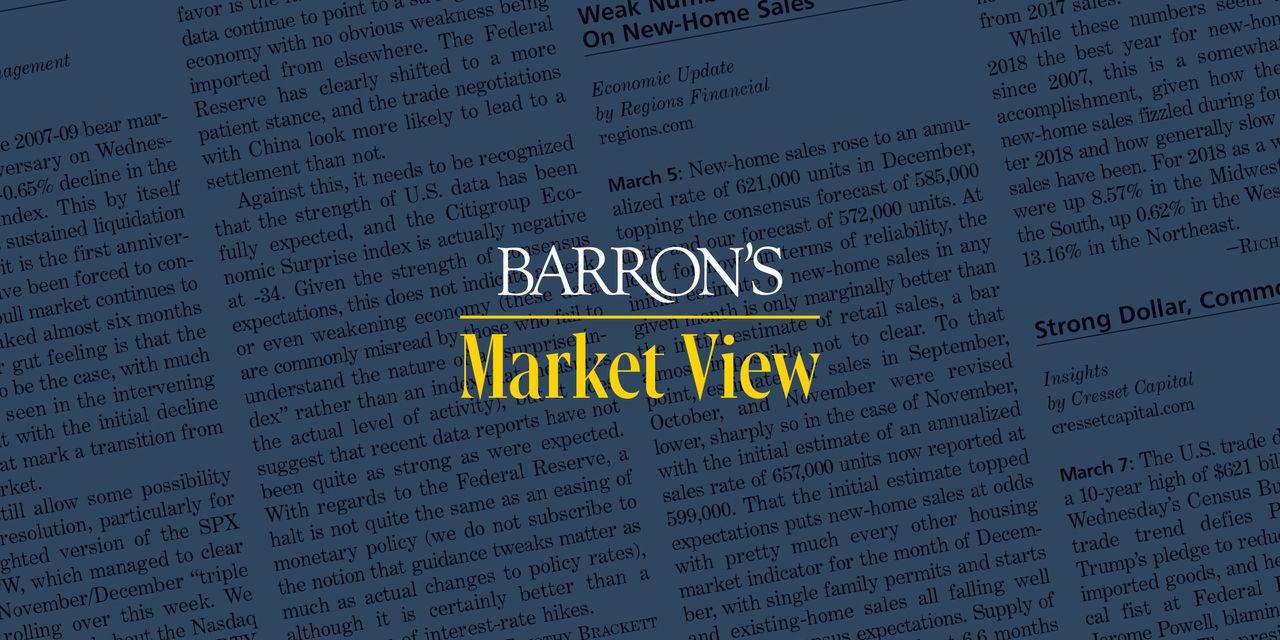This commentary was issued recently by money managers, research firms, and market newsletter writers and has been edited by Barron’s.
Momentum Looks Good
Ivan Feinseth Market View 360
Tigress Financial Intelligence
March 30: A reacceleration in growth guidance from
Micron Technology
[ticker: MU], along with new-product announcements from
Intel
[INTC] and further upward momentum in
Nvidia
[NVDA] on AI-driven optimism [have] helped drive a broad-based semiconductor rally and led the tech sector as it emerges into a [stock market] leadership position once again.
As hearings go on over the banking failures, concerns over contagion continue to fade, and the market looks to be shifting its focus forward, with the
S&P 500
index closing above 4000.…If we had never had the disruption of the banking sector, stock prices most likely would be even higher as we see what looks to be a further acceleration in upward momentum.
Ivan Feinseth
Vulnerable Coasts?
The Weekly Speculator
Marketfield Asset Management
March 30: Just three weeks after the problems at Silicon Valley Bank started to become apparent, the SPX stands slightly higher, at 4027, than it was on March 8, at 3992. This is a reflection of the degree to which stress in regional banks has been successfully contained, with actual failures limited to just three institutions, thanks to the very generous additional liquidity provided by the Federal Reserve and the relatively efficient cleanup of the defunct institutions by the FDIC. However, the U.S. regional-bank sector [is] under considerable pressure to rein in risk, and financial regulators [are] likely to take a much more rigorous stance when judging interest-rate and credit risk.
This marks a further transition away from easy credit, one that will be distributed very unevenly on both a geographic and sectoral basis. As far as geography is concerned, the coasts seem particularly vulnerable, with New York and San Francisco losing key lending institutions for their local economy. Obviously, both cities are still well served by a large number of alternatives, but both have lost lenders with exceptionally deep local relationships that will arguably be hard to replicate. Commercial real estate and venture capital appear to be the sectors with the most to lose from recent events, with the former particularly likely to become a focus of bank regulators.
Michael Shaoul and Timothy Brackett
The Clean-Energy Slog
Eye on the Market
J.P. Morgan Private Bank
March 28: After $6.3 trillion spent on renewable energy and another $3.3 trillion spent on electricity networks since 2005, global energy use is still 80% reliant on fossil fuels, from a low of 70% in Europe to 86% in emerging markets ex-China. The global measure has declined by just 5% since 2005, due to challenges in electrifying industrial, commercial, residential, and transportation energy.
The transition’s primary obstacles [are] permit delays for generation and transmission, frequent lack of eminent domain in the West, availability of critical minerals and rising resource nationalism, and the high cost per unit of energy needed to decarbonize industrial heat, backup thermal power and storage costs required to accompany intermittent wind and solar power, challenges for grid managers integrating thousands of new wind and solar projects, the long useful lives of existing machines/vehicles/furnaces, and the time it takes to build new engines and turbines to use new forms of energy.
I remain unconvinced that starving the oil-and-gas industry of capital will make the transition any faster, particularly since new pools of capital will step in as long as demand for fossil fuels exists. Such an approach could also expose countries to energy shortages that renewables currently can’t fill. Europe is still paying a heavy price for mismanaging energy supplies while its transition is ongoing. Advice to the handful of countries with ample oil and gas reserves: The renewable transition is picking up speed, but “don’t quit your day job.” You will need those reserves for many years to come, unless the world delivers on a set of very ambitious pledges to decarbonize at a totally unprecedented pace.
Michael Cembalest
The Fed’s Still Not Done
Insights
Northern Trust
March 27: We have, for some time, cautiously issued forecasts of slow and steady growth for the U.S. economy. These outlooks have come with one crucial caveat: They assume that nothing else goes wrong. Recent financial events have us questioning whether that condition has been breached. The failures of Silicon Valley Bank and Signature Bank, and the forced merger of Credit Suisse, have unnerved financial markets and increased recession risk.
The Federal Open Market Committee has a dual mandate of maximizing employment and stabilizing prices. While the battle against inflation isn’t over, the Fed must ensure that it maintains the safety and soundness of—and, ultimately, confidence in—the banking system. Ideally, this will be handled outside of the monetary-policy process.
We expect recent banking troubles to curb credit extension, impairing growth. But the incremental deceleration will probably not be enough to place the Fed on hold. One more quarter-point interest-rate hike is expected in May, followed by a long pause.
Carl R. Tannenbaum, Ryan James Boyle, and Vaibhav Tandon
Bear Threatens Greenback
The Aden Forecast
Aden Forecast
March 28: Today, the U.S. dollar index fell to an eight-week low. The weakness is gaining momentum, and if the dollar index drops below 101, it will mark the onset of a renewed bear market decline. If it does, the environment would then turn bullish for most of the [other] major currencies, and we’d want to buy a couple of the stronger ones. For now, however, keep your cash in your home currency.
Pamela Aden and Mary Anne Aden
To be considered for this section, material, with the author’s name and address, should be sent to [email protected].
Read the full article here










